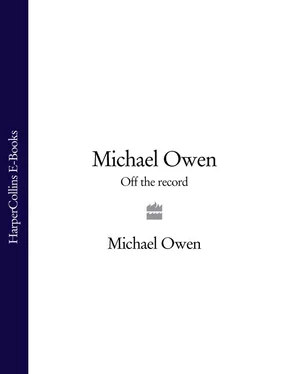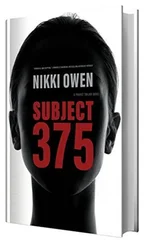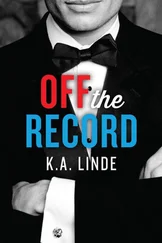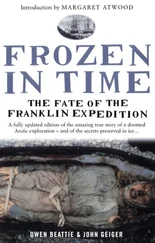It was at the age of 10 that boxing was added to my list of sporting activities. A little known story about me is that I boxed in two proper club fights, one in front of the dickiebow brigade. It was Dad’s intention to make me stronger physically and toughen me up mentally, so he took me to the local boxing gym – the Deeside Boxing Club, above a pub in Shotton – where I watched a training session one afternoon and joined the following day. Organized fighting tends to be a fad for a lot of boys. They come in for a session or two and then disappear, often when the going gets really tough. But I stayed with it for three years because I enjoyed it so much.
The first of my serious bouts came after I’d played for Deeside Primary Schools that same day. The fight was in the evening, and I found myself opening a 10-fight bill in Anglesey in front of an audience wearing dinner jackets and bow ties. Never mind taking a penalty in the World Cup, nothing compares to being in a boxing match. My first opponent had already had a couple of fights, and I was much lighter than him, so I made sure I protected myself down below by inserting the proper guard. I wore all the body armour I could to make the weight. I just about managed to get close enough to him on the scales for the bout to go ahead, and the next thing I knew I was climbing through the ropes for the opening contest in the short but eventful boxing career of Michael Owen.
I won on a split decision. It should have been unanimous, or so I believed. My corner and my family thought so too. A couple of experts came up to me that night and said, ‘Fantastic performance. That should get you the boxer of the night award.’ But a heavyweight who won the final bout of the night just beat me to it. By then I was becoming passionate about the sport.
My victim wanted a rematch. This time we met on my home ground, at Connah’s Quay Civic Centre, in front of a thousand spectators. I didn’t box quite as well but won on a split decision again. Home advantage probably helped. And this time I was named boxer of the night. I still have the programme, which cost 20p, for this, my second and final bout. The date on it is 14 March 1990, it was billed as ‘An Evening of Boxing on behalf of Guide Dogs for the Blind’, and it was organized by the R & B Golf Society. There, among the ‘senior’ bouts consisting of three two-minute rounds, is S. Kavanach of Anglesey v. M. Owen of Deeside. I wonder what happened to my great rival, S. Kavanach?
With two wins under my belt, my next fight was scheduled for Wrexham, but my opponent failed to show. By this time, however, football was beginning to take over and I was moving up through the ranks. A place at Lilleshall, the Football Association’s national academy, was on the horizon, so my life as a boxer was brought to a premature end.
I’m certain that putting myself through the trial of a proper boxing match had a beneficial effect. I didn’t know at the time that it was Dad’s intention to toughen me up. He now admits that the idea was to give me an extra layer of protection against the jealousy I aroused at school. I wouldn’t say boxing increased my muscle bulk or changed me physically, but it helped me learn how to look after myself. It was certainly more mentally challenging than rugby, cricket or athletics, which I also took part in (when it came to school sports I grabbed whatever was going). If I got kicked and stayed down when I wasn’t properly hurt I got a rollicking from Dad. In fact, I only needed to do it once to learn not to do it again. Apparently he was a fearless player who wouldn’t be afraid to put his head where it hurt. He came from a tough part of Liverpool, and his mentality was that you don’t go down unless you’re in real pain.
I suppose I’m quite old-fashioned when it comes to playing the game. Umbro, one of my major sponsors, are always trying to twist my arm to get more colour into the boots they make for me, and as I’ve grown older I’ve let them inject a little more white. Football is full of passing fashions, such as coloured boots, or pulling your socks up above the knees, but I’m not the sort of player who would shave one eyebrow for effect. I’m not into trends. I’m not saying that makes me better than anyone else, but my attitude is similar to my father’s: just play the game like a normal man.
One of the worst things to have crept into football in recent years is the crowding of referees. If you do that, and push and shove one another, you make the incident look more serious than it is. When I first came into the Premier League players had plenty of respect for one another; it would have been unthinkable to try to get an opponent sent off. Nowadays if you even touch a goalkeeper the whole defence comes over and pushes you around. The crowd starts shouting, the ref feels an exaggerated sense of urgency, and red and yellow cards start flying. There just isn’t as much mutual respect among players as there used to be.
But back to my childhood. A major feature of my footballing repertoire is explosive speed over short distances. Third in a county race at the age of 12 was the full extent of my honours as a young sprinter, though I did once cover the 100 metres in 11.4 seconds. My size helped. In my early teens I was half the height of most of my contemporaries, which helped me achieve that extra pace. But it wasn’t until I was about 18 that I started to become not just fast but powerfully quick. By then I was growing into my frame. Dad tells the story of how he took me to the local leisure centre for an indoor match when I was five. He sat up on the balcony watching, and remembers noticing that I side-footed the ball into the goal rather than blasting it. Later he told Mum, ‘If Michael’s got pace as well, he’s going to be some player.’ Soon it became apparent that I could burst away over 40 or 50 yards.
My two brothers were also good footballers. They had a lot in the locker. As he would tell you himself with a smile, my eldest brother, Terry, did what many keen footballers do and became a bit too fond of smoking and drinking. Andy had attributes that would be highly valued today. He was blisteringly fast. These days, if you’re quick and you can kick a ball in the right direction you can make a decent living in the lower leagues. I wouldn’t say Andy went off the rails, but he got himself a girlfriend he was passionate about and didn’t want to put in the time on the training ground. He was at Chester (Third Division) for a while, and he played for Holywell Town (Welsh Premier League). You’re not a mug if you’re competing at that level. Both Andy and Terry got paid for playing.
When the family get together, we fall about laughing when the talk gets round to ‘what might have been’ for my brothers. When Andy has had a couple of drinks he starts saying, ‘I could have been as good as Michael if I hadn’t found a girlfriend or hit the ale.’ It’s hilarious, and he knows it too. There’s nothing funnier in the world than Andy telling us how fast he was and how many goals he scored. He will turn to Dad and say, ‘Come on, Dad, tell ’em how fast I was!’ And Dad will back him up, playing him on a string. Terry doesn’t make the same claims; he’s happy to have chosen the easier life, without football as an obsession. Even at 32, though, Andy insists he could still make the grade for a couple of years. Usually when he’s had a couple of drinks.
Speed is the key to my battles with the game’s best defenders. The tough ones are the quick ones. Size doesn’t bother me, because my main weapon is pace; it’s the fast ones who negate some of my natural swiftness. Marcel Desailly springs to mind in that respect. In his prime, he was a beast to play against. Martin Keown was also quick on his feet. At his peak, you wouldn’t find yourself sprinting past Martin. Of the current generation, John Terry is not as quick as some, but he gets very tight to you and it’s difficult to turn against him. Rio Ferdinand is fast, but he also likes to give you a chance. He likes to play a bit. He wouldn’t mind you thinking you were on to a good thing and then reaching the ball first to do a Cruyff turn. You think you’re going to get round him but then he sticks out one of those long legs and steals the ball. Jaap Stam was also a really world-class defender, on account of his speed, size and aggression. That’s the real modern defender. Football’s moved on from the age of the big stopper always heading the ball. Walter Samuel, of Roma and Argentina, is another to have given me trouble. We’ve had a few good tussles.
Читать дальше











